
Articles by Malawi

Our Statement on the Reinstatement of the Global Gag Rule
On 24 January 2025, President Trump signed an executive order reinstating the Global Gag Rule (GGR). The International Planned Parenthood Federation (IPPF) - a federation of members and partners in 153 countries - fights for the right of every individual to decide about their own health, well-being and life. IPPF will never support policies which actively restrict or violate an individual’s right to bodily autonomy, including the right to safe abortion. The GGR - also known as the Mexico City Policy - violates human rights by forcing women to continue with an unwanted pregnancy or into unsafe abortion, and IPPF will not tolerate it. The GGR is a far-reaching, destructive American foreign policy, one that is deeply unpopular with the American people. It denies U.S. funding to organisations like IPPF if they use money from other donors to provide safe abortion services, counselling or referrals. It blocks critical funding for health services like contraception, maternal health, abortion care, and HIV/AIDS prevention and treatment for organisations that refuse to sign it. When it has been enacted by previous Republican Presidents, evidence has shown that the GGR has led to an increase in maternal deaths, in unplanned pregnancies and unsafe abortions. It blocks access to health care for women and the most vulnerable people, silences SRHR advocates, reduces coverage of community health workers, and infringes on a country’s sovereignty. The Global Gag Rule’s reinstatement will result in an escalation in avoidable health crises, needless physical and emotional harm, a loss of dignity for women, and death. IPPF anticipates it will lose $61 million USD for programs that provide sexual and reproductive health services for millions of women and youth. 13 countries and 16 healthcare projects worldwide are affected by the Global Gag Rule. Without funding, the people we serve will otherwise go without these vital services, including women suffering the burden of health and humanitarian crises. Donald Makwakwa, Executive Director, Family Planning Association of Malawi (FPAM): "The reinstatement of the global gag rule will have devastating consequences for women and girls in Malawi, where access to sexual and reproductive health services is already limited. Projected funding cuts to FPAM will disproportionately harm women and young girls in Malawi, many of whom rely on these services to avoid unplanned pregnancies, unsafe abortions, and maternal deaths. It is a cruel policy that sacrifices lives and bodily autonomy." The global gag is further insult to injury on top of other U.S. foreign policies that have a catastrophic impact on the communities in which our MAs work. Just yesterday, the State Department’s Office of Foreign Assistance sent a global cable that ordered an immediate pause on new foreign aid spending, as well as a stop-work order for existing grants and contracts. The new executive action targeting transgender, non-binary and intersex individuals has resulted in great fear for our communities. We have already seen funding cut as a result of its new anti-DEI executive action. The US also announced it plans to renew its membership of the Geneva Consensus Declaration, an anti-abortion joint statement initially cosponsored by persons claiming to represent the governments of Brazil, Egypt, Hungary, Indonesia, Uganda, and the United States. It was signed by persons from 34 countries on October 22, 2020. It is clear foreign aid has become a political weapon, used to enforce hateful ideologies at the expense of women in all their diversity, and against LGBTQI+, poor and immigrant communities. We cannot—and will not—deny life-saving services to the people we serve. We urge other governments and donors to step forward and call out the damage and destruction of these destructive actions. We stand in solidarity with our community. Now is the time for our movement to unite, to come together and to fight for a world of sexual and reproductive health, rights and justice for ALL. Learn more about Global Gag Rule here: The Global Gag Rule | IPPF For more information, please contact [email protected] or +44 7918 845 944. About the International Planned Parenthood Federation IPPF is a global healthcare provider and a leading advocate of sexual and reproductive health and rights (SRHR) for all. Led by a courageous and determined group of women, IPPF was founded in 1952 at the Third International Planned Parenthood Conference. Today, we are a movement of 158 Member Associations and Collaborative Partners with a presence in over 153 countries. Our work is wide-ranging, including comprehensive sex education, provision of contraceptive, safe abortion, and maternal care and responding to humanitarian crises. We pride ourselves on being local through our members and global through our network. At the heart of our mission is the provision of – and advocacy in support of – integrated healthcare to anyone who needs it regardless of race, gender, sex, income, and crucially no matter how remote.
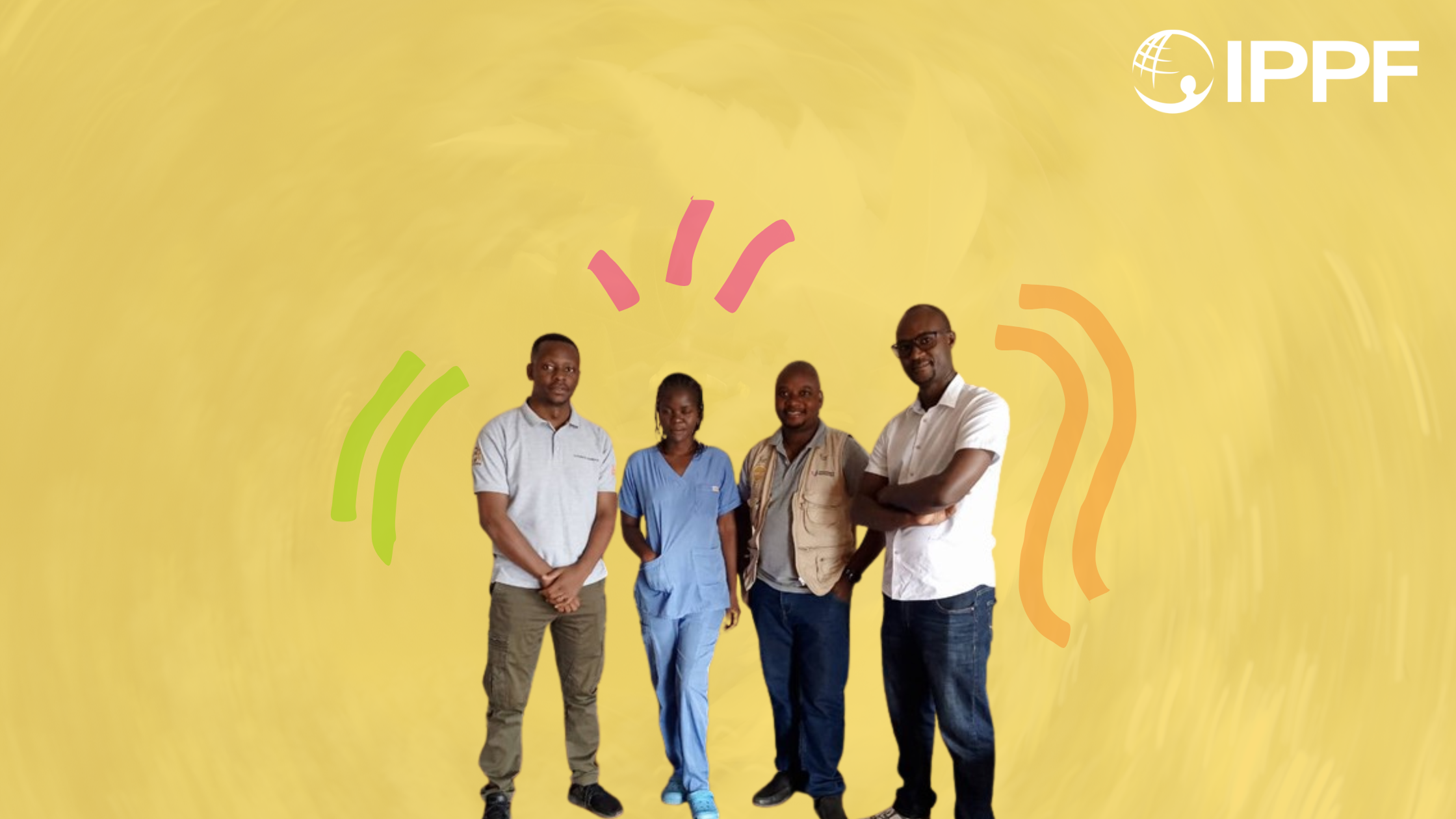
Malawi: Empowering Communities, Ending HIV
On World AIDS Day, we commemorate the remarkable achievements of IPPF Member Associations in their unwavering commitment to combating the HIV epidemic. Their tireless efforts have significantly expanded access to prevention, sexual and reproductive health services, and rights, transforming the lives of countless individuals worldwide. One of the key achievements of IPPF Member Associations has been their ability to expand access to essential sexual and reproductive health services through innovative approaches to HIV prevention, testing, and treatment. By establishing comprehensive service delivery networks and building the capacity of healthcare providers, they have ensured that individuals can access the care they need, regardless of their geographic location or socioeconomic status. At the Family Planning Association of Malawi (FPAM), we are not only service providers; we're challenging the status quo. By putting clients at the center of our work and championing innovative solutions, we are fighting for a future where everyone, regardless of their background, has access to the sexual and reproductive health services they deserve. FPAM is committed to delivering evidence-based HIV prevention interventions, including the latest technologies like CAB-LA, an injectable, long-acting form of PrEP. By identifying and engaging with communities and collaborating with organizations, we aim to increase access to these life-saving services and ultimately reducing HIV transmissions. Strengthening Communities, Preventing HIV: Our Commitment To ensure the successful implementation of these new HIV prevention interventions, at FPAM we have adopted a multifaceted approach. We have identified and prioritized high-risk communities, including men who have sex with men, trans communities, sex worker communities, and young women. By working closely with community-led organizations, we are reaching marginalized populations and addressing their needs. FPAM is committed to fostering strong partnerships to improve access to sexual and reproductive health services, including HIV prevention. By collaborating with government agencies, community-based organizations, and other stakeholders, we are confident in our ability to make a significant impact on HIV prevention and improve the health and well-being of our communities. We have partnered with the Ministry of Health through the Department of HIV, STI and Viral Hepatitis (DHA) to strengthen the capacity of healthcare providers and ensure the availability of essential services. Through joint efforts, we have conducted training sessions with out staff on PrEP, developed guidelines, and implemented quality assurance measures. We have also collaborated with the National AIDS Commission (NAC) on the navigation of prevention programs, especially with the key population whose HIV prevalence is high. By listening to the needs of our communities, we can tailor our interventions to their specific circumstances. Community engagement is at the heart of our approach. We work closely with community-based organizations to reach marginalized populations, address stigma, and promote behavior change. FPAM is working with Men of Tomorrow (MOTO), which works with men. This will be a way of reaching out to Men with PrEP information and services. FPAM will work with Youth Clubs and Community Based Organisations (CBOs) for demand creation and client linkage for PrEP services. FPAM intends to engage the Reproductive Health Directorate to discuss strategies for delivering CAB-LA to breastfeeding and pregnant women. This population has highest knowledge gap on PrEP according to the dialogue sessions that were conducted. By building strong partnerships and leveraging our collective expertise, we are making significant strides in the fight against HIV. Together, we can create a healthier future for all.

IPPF marks World AIDS Day by announcing the launch of a special program to roll out new biomedical HIV prevention methods
IPPF provides comprehensive sexual and reproductive health care to clients around the world. HIV testing, prevention, and treatment services are essential parts of our integrated sexual and reproductive health care package. To expand the choices individuals have to protect themselves from HIV, IPPF is excited to announce a special program to provide the newest methods of HIV prevention - injectable PrEP (a 2-monthly injection of cabotegravir-LA) and the vaginal ring (a monthly vaginal ring of dapivirine), as well as expanding where oral PrEP is offered. This program is being launched through a consortium of IPPF Member Associations called the Consortium to Advance Access to new HIV Prevention Products (CAAPP) - led by Family Planning Association of India, and including the Family Life Association of Eswatini, Lesotho Planned Parenthood Association, Family Planning Association of Malawi, Federation of Reproductive Health Associations, Malaysia, Family Planning Association of Nepal, and Planned Parenthood Association of Thailand. We hope this program will increase access to the number of ways people can protect themselves from HIV, supporting individual's choice to find an HIV prevention method that works for them.

“Pads are seen as luxuries” – How Malawians are tackling period poverty
People with paid jobs are joyful when a month comes to its end because it signifies an influx of cash into their bank accounts and pockets. But for some women and girls, the end of the month stirs anxiety because they’re thinking about their next period, and if they can afford their menstrual hygiene products if it arrives before they get paid. In Malawi – where almost half of the population lives below the poverty line and 25 in every 100 people live in extreme poverty – only a few girls and women can afford sanitary pads. Too embarrassed to go to school Menstruation, lasting about five days, requires an average of K600 ($0.74 USD) worth of pads a month for most. That money is too much for some girls, such as Lilongwe-based Prudence Chavula, who recalls with apprehension the first days of her periods when she would use rags to keep the flow in check. “I was nine years old when I started menstruating. Back then, my parents could not afford to buy the pads every month, so I had to use shreds of old pieces of fabric,” Prudence explains. She says it was embarrassing going to school while having her periods since the rags could easily leak and produce a bad smell. Prudence concedes it is not easy for many girls and women from low-income families to afford sanitary products. Thus, she says, they opt for alternatives which are usually unhygienic and hazardous to their health, sometimes leading to urinary tract infections.
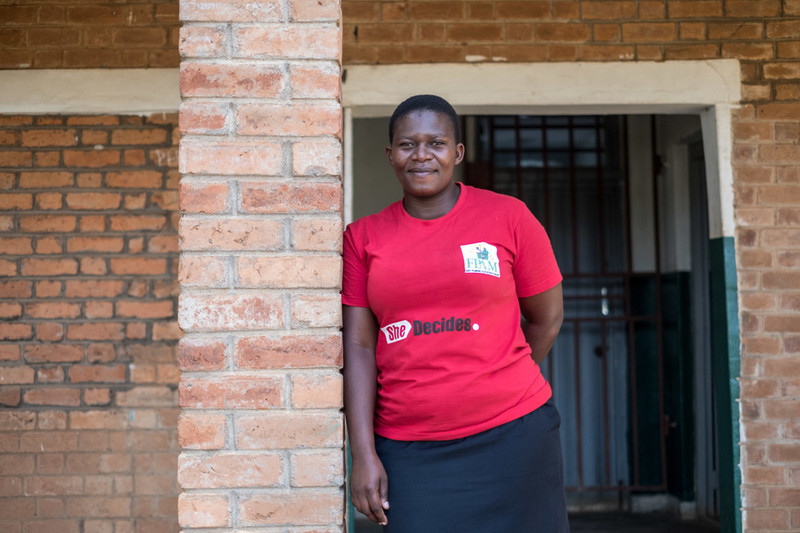
The Global Gag Rule stops care to sex workers
“People think many things of sex workers. They shout at them, speak ill of them, think they are bad people,” says Rachael Banda, a 32-year-old community reproductive health promoter for the Family Planning Association of Malawi (FPAM) in the sleepy northern city of Mzuzu. “But they are not only sex workers, they are many things. Some of them want to do this work, some are there because it’s their business - and with the money they build houses, they pay school fees for their children." Rachael was an outreach worker for Linkages, a project providing sexual and reproductive healthcare to sex workers, which ran in Mzuzu. But in 2017 it was suddenly discontinued following the Global Gag Rule. In 2018, UNAIDS reported that 55% of sex workers in Malawi were estimated to be living with HIV. While condom and ARV use has significantly improved within the community, in 2018 it was also estimated that close to a quarter of HIV-positive sex workers were unaware of their status. Keeping each other safe “I wouldn’t be alive today if it wasn’t for Linkages,” says 30-year-old sex worker *Marianne simply. When outreach workers in Mzuzu met Marianne at a bar, she says she was having unprotected sex and drinking and smoking heavily. “I was just doing everything that I could think of doing,” she explains, but says the project gave her the information she needed to “take care of myself.” Marianne, who is HIV positive, says she was often ill but now feels in a better position to take care of her family. In her eyes, the main benefit of Linkages was that it reached everyone in her community - including those who didn’t feel comfortable going to hospitals for care. Going to hospitals can be difficult for sex workers in Malawi, who are often stigmatized by patients and service providers alike. They can even encounter clients at hospitals, which can mean “clients can end their relationships with us because they know we are testing for STIs,” says Memory, a 32-year-old sex worker in Lilongwe. Because public hospitals are oversubscribed, patients need to arrive early to queue - but this is often not possible for sex workers who have been up through the night, explains Marianne. In Mzuzu, she says the situation improved when Linkages trained hospital staff to treat sex workers respectfully and provided the women with “slips which meant we would be seen quickly and could return to our work,” she says. Bringing care directly to clients “Sex workers are very busy people,” explains Rachael, who travelled to ‘hotspot’ bars in Mzuzu around-the-clock to provide sex workers with contraception and STI testing and treatment. “If we go to them, they can leave a client in their room, receive services from us and then go back to their room and make their business,” she says, adding that it was her responsibility to follow up with the sex workers afterwards to make sure their treatment was working. “I can say I know every bar in this town now!” Rachael laughs. “We treat everyone equally, out in the community and here in the centre,” says Rachael, speaking at the FPAM Youth Life Centre in Mzuzu. Through the Linkages initiative, sex workers were also trained and hired in two other drop-in centres as receptionists, cleaners, and outreach workers. Though FPAM is no longer running those centres, the women are still working there. In Mzuzu and Lilongwe, Malawi’s capital, Linkages trained sex workers as peer educators in sexual and reproductive healthcare and information, which women in both cities say has had a lasting impact. Cecilia, a 36-year-old sex worker and peer educator from Lilongwe, says that going through an HIV test herself gave her the confidence to encourage her friends to do the same. “That can only happen when you’re from the same community and are facing the same issues,” she explained. Her friend Mary, also a Lilongwe-based sex worker, agrees that Linkages brought their community together, particularly when deciding as a group what action to take when someone has been sexually assaulted. Marianne says that she now takes pride in keeping herself and her community safe. “With the new information I got, I was protecting my friends by using a condom when a man comes, so that when another woman sleeps with the same man she won’t get the same infection.” *Pseudonym
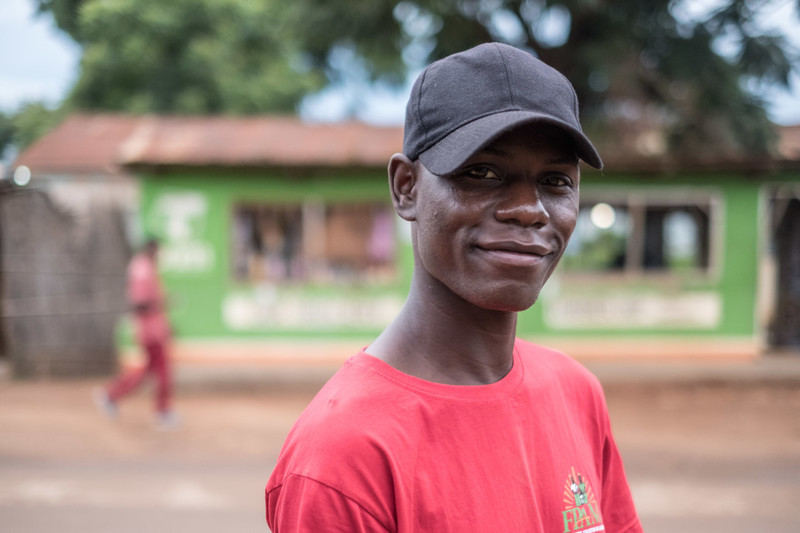
"Social networks are developing each day"
Sitting outside Lilongwe Youth Life Centre on a sunny Thursday afternoon, 24-year-old Rodrick is glued to his phone. When asked to show some of his posts, he asks “what do you want to see, Instagram, WhatsApp, Facebook?” Rodrick and his friends laugh at a post of a smiling cartoon condom fighting off multicoloured STIs. SheDecides promotes change through social media Rodrick is a trained Social Media Agent for SheDecides, a movement empowering youth to champion the rights of girls and women to make choices about their lives and bodies and have access to comprehensive sexual and reproductive health education. “Social networks are developing each and every day, so more young people are now on social media,” explains Rodrick, adding that many young people don’t have access to books to read about sexual and reproductive health and rights. “It’s better to reach them on social media so they can see it,” says Rodrick, although he admits that many people in Malawi cannot afford internet data bundles on their phones. He says that he and other Youth Action Movement volunteers try to get out daily posts on social media channels to educate other young people about the issues they are passionate about. “One day I posted asking why the government of Malawi doesn’t legalize abortion, which I think is not good for the girls because they have their lives to live,” says Rodrick, adding that he believes abortion can keep more girls in education. Rodrick says that while people don’t always agree with him, he enjoys discussing the topic on social media. “People ask ‘are you a real man?’” he laughs. "I debate so much, and I like that! And sometimes I convince people that what I’m saying is right.” Supporting young people through personal challenges As well as getting into lively debates on social media, Rodrick says he is often sent private messages by young people who feel they can open up to him as a peer with knowledge about sexual health. A 16-year-old girl messaged Rodrick on WhatsApp, telling him she had been raped and was pregnant. “I asked her if she was comfortable with the pregnancy and she said no, how can I be comfortable with a pregnancy that I didn’t want to come to me?” She then asked Rodrick how he could help her with the issue. “I said I will help you, though I’m not the person responsible I’ll take you to the person who is so they can handle that issue.” Rodrick then met up with the girl, who went on to access abortion counselling. He says that the case also went to court, and is awaiting the verdict. “We always say this thing can be done by a male, and this thing can be done by a female,” says Rodrick, talking about gender inequality and his involvement in SheDecides. “But that’s not right. We’re all humans and should be able to do whatever he or she wants to do.”
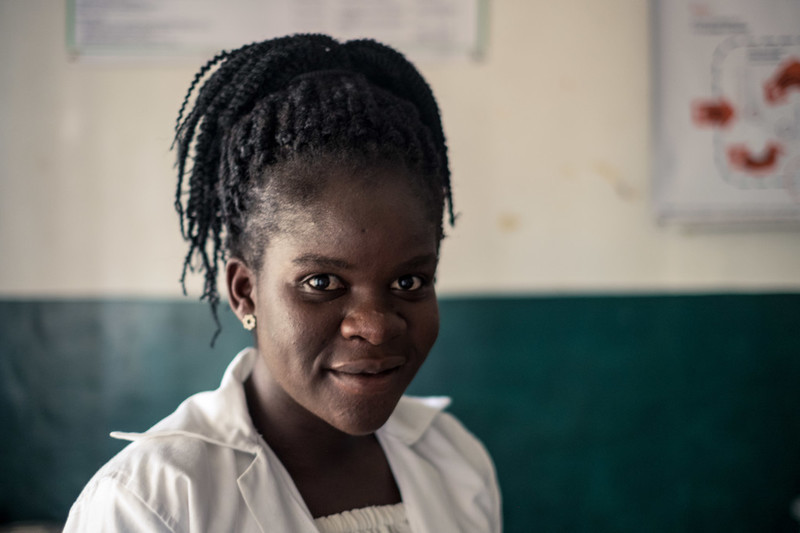
“Most NGOs don’t come here because it’s so hard to reach”
Dressed in a sparkling white medical coat, Alinafe runs one of Family Planning Association of Malawi (FPAM) mobile clinics in the village of Chigude. Under the hot midday sun, she patiently answering the questions of staff, volunteers and clients - all while heavily pregnant herself. Delivering care to remote communities “Most NGOs don’t come here because it’s so hard to reach,” she says, as women queue up in neat lines in front of two khaki tents to receive anything from a cervical cancer screening to abortion counselling. Without the mobile clinic, local women risk life-threatening health issues as a result of unsafe abortion or illnesses linked to undiagnosed HIV status. According to the Guttmacher Institute, complications from abortion are the cause of 6–18% of maternal deaths in Malawi. District Manager Alinafe joined the Family Planning Association of Malawi in 2016, when she was just 20 years old, after going to nursing school and getting her degree in public health. She was one of the team involved in the Linkages project, which provided free family planning care to sex workers in Mzuzu until it was discontinued following the 2017 Global Gag Rule. Seeing the impact of lost funding on care “This change has reduced our reach,” Alinafe says, explaining that before the Gag Rule they were reaching sex workers in all four traditional authorities in Mzimba North - now they mostly work in just one. She says this means they are “denying people services which are very important” and without reaching people with sexual and reproductive healthcare, increasing the risk of STIs. The reduction in healthcare has also led to a breakdown in the trust FPAM had worked to build in communities, gaining support from those in respected positions such as chiefs. “Important people in the communities have been complaining to us, saying why did you do this? You were here, these things were happening and our people were benefiting a lot but now nothing is good at all,” explains Alinafe. Still, she is determined to serve her community against the odds - running the outreach clinic funded by Global Affairs Canada five times a week, in four traditional authorities, as well as the FPAM Youth Life Centre in Mzuzu. “On a serious note, unsafe abortions are happening in this area at a very high rate,” says Alinafe at the FPAM clinic in Chigude. “Talking about abortions is a very important thing. Whether we like it or not, on-the-ground these things are really happening, so we can’t ignore them.”
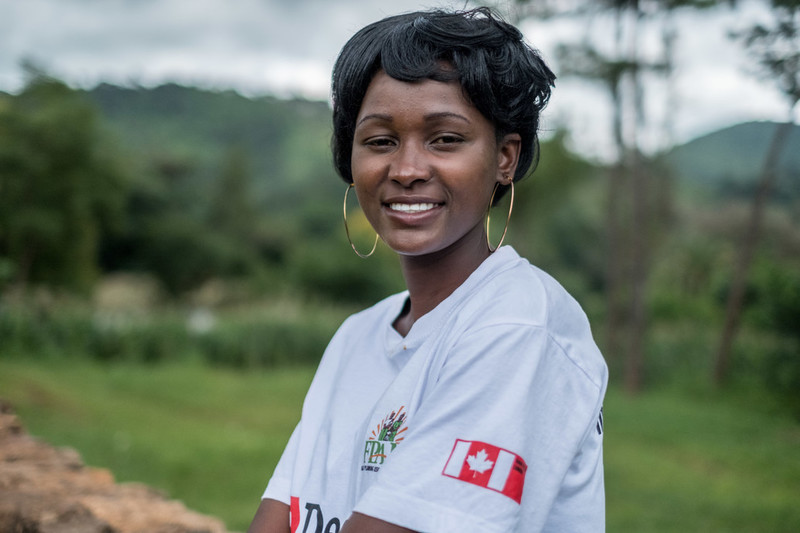
“It’s important to teach girls about abortion”
For Jennipher, who lives in a village outside of Lilongwe, unintended pregnancies amongst young women and girls like her are an everyday reality. “Girls often speak to me about these issues because they know I come to the Youth Life Centre and that I know a lot about these issues,” explains Jennipher, who wears a baggy white t-shirt and big hoop earrings. “They are happy to talk to me about these issues because I’m young and also a girl. It’s hard for girls to talk about these issues to their families because they might not believe them,” says Jennipher, who is a Youth Action Movement (YAM) volunteer in her local area, Dowa. “It’s important to teach girls about abortion so they know how to take care of themselves and stop risking their lives,” she adds. Teaching peers how to avoid unwanted pregnancy Off the top of her head, Jennipher can think of two close friends who have experienced unwanted pregnancies at a young age. One was just 14 when she fell pregnant and, desperate, had an unsafe abortion. “There was a lot of blood. I helped her by taking her here [to the Youth Life Centre] for treatment. Now she’s quite fine and back at school after recovering,” says Jennipher. Another friend was 18 when she got pregnant, but ended up keeping her baby. Jennipher says she encouraged her friend to get help at the center “so she could learn a lot of things and maybe get contraception, so she can go back to school again and have a bright future.” Two years on, her friend is back at school and her mother takes care of the baby while she is studying. “She even joined the Youth Action Movement, so we are together here,” smiles Jennipher. Passionate about education These experiences have made Jennipher passionate about educating young women and girls in her community about contraception, with the aim of keeping them safe, healthy, and in school. As a YAM volunteer she also gets approached by girls who have experienced sexual abuse, often within the family. Another friend of Jennipher’s told her that her sister’s husband wanted to sleep with her. “In these cases, sometimes the girls choose to be silent for fear that the breadwinner might be arrested and then the family will suffer,” she explains. But with a well-informed peer like Jennipher to confide in, her friend was advised to go to the authorities and to the center for guidance. Looking to the future, Jennipher says she wants to have two or three children. “That would be enough!” She laughs. She also plans to make a career out of her skill for caring for others. “I want to be a secondary teacher or a nurse. I want to help people.”
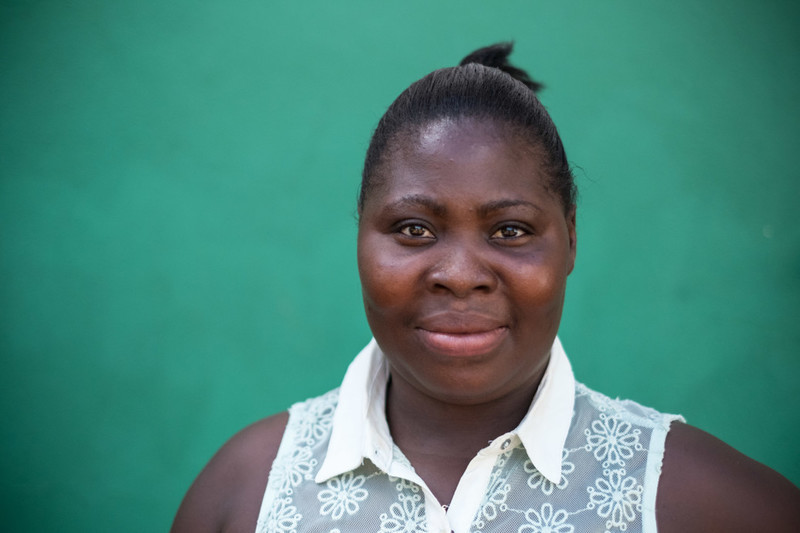
“I learnt about condoms and even female condoms"
Mary, a 30-year-old sex worker, happily drinks a beer at one of the bars she works at in downtown Lilongwe. Her grin is reflected in the entirely mirrored walls, lit with red and blue neon lights. Above her, a DJ sat in an elevated booth is playing pumping dancehall while a handful of people around the bar nod and dance along to the music. It’s not even midday yet. Mary got introduced to the Family Planning Association of Malawi through friends, who invited her to a training session for sex worker ‘peer educators’ on issues related to sexual and reproductive health and rights as part of the Linkages project. “I learnt about condoms and even female condoms, which I hadn’t heard of before,” remembers Mary. Life-changing care and support But the most life-changing care she received was an HIV test, where she learnt that she was positive and began anti-retroviral treatment (ART). “It was hard for me at first, but then I realized I had to start a new life,” says Mary, saying this included being open with her son about her status, who was 15 at the time. According to UNAIDS 2018 data, 9.2% of adult Malawians are living with HIV. Women and sex workers are disproportionately affected - the same year, 55% of sex workers were estimated to be living with HIV. Mary says she now feels much healthier and is open with her friends in the sex worker community about her status, also encouraging them to get tested for HIV. “Linkages brought us all closer together as we became open about these issues with each other,” remembers Mary. Looking out for other sex workers As a peer educator, Mary became a go-to person for other sex workers to turn to in cases of sexual assault. “I’ll receive a message from someone who has been assaulted, then call everyone together to discuss the issue, and we’d escort that person to report to police,” says Mary. During the Linkages project - which was impacted by the Global Gag Rule and abruptly discontinued in 2017 - Mary was given an allowance to travel to different ‘hotspot’ areas. In these bars and lodges, she explains in detail how she would go from room-to-room handing out male and female condoms and showing her peers how to use them. FPAM healthcare teams would also go directly to the hotspots reaching women with healthcare such as STI testing and abortion counselling. FPAM’s teams know how crucial it is to provide healthcare to their clients ensuring it is non-judgmental and confidential. This is a vital service: Mary says she has had four sex worker friends die as a result of unsafe abortions, and lack of knowledge about post-abortion care. “Since the project ended, most of us find it difficult to access these services,” says Mary, adding that “New sex workers don’t have the information I have, and without Linkages we’re not able to reach all the hotspot bars in Lilongwe to educate them.”
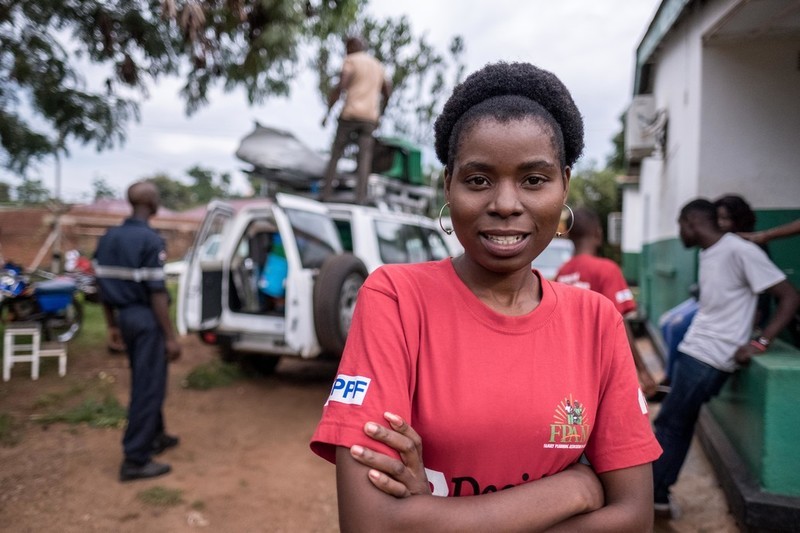
Young volunteers connect their peers to information and contraceptive care
In Chigude, a usually quiet rural village in northern Malawi, young people gather around two tables laughing and chatting animatedly. On one table, they are playing a traditional mancala board game Bawo. On the other, volunteers demonstrate putting a condom onto a wooden model penis. Though this is inevitably met with shouts and giggles, the largely male crowd watches intently. “Most of them have come here for condoms, but I don’t just give them out,” says Kondwani, a 22-year-old Youth Action Movement (YAM) volunteer. “I ask them how do you use a condom? How is it useful to somebody who is using it?” Committed to sharing knowledge with their peers Activities like this in hard-to-reach areas are one of many that the Youth Action Movement delivers across Malawi. Trained and hosted by Youth Life Centres, which provide sexual and reproductive healthcare aimed at youth, the volunteers meet regularly and reach out to their peers in schools, universities, and on social media. Phoebe, 22, is a YAM volunteer in Malawi’s capital, Lilongwe. “It’s hard for girls to speak out about sexual abuse because they fear the community will talk about them and blame them,” she explains, adding that a particular fear of being thrown out of their homes after opening up to their parents is one reason why girls are more comfortable opening up to their peers. This is why trained volunteers like Phoebe are often approached by other young women who have been sexually assaulted. “When this happens, I speak to other YAM members about it and we decide what advice to give,” she says. This will usually involve giving advice and sometimes going with young people to their local Youth Life Centre for STI testing and abortion counselling, as well as the hospital and the police, depending on the case. “I tell girls they can decide what to do about their lives, their future and their bodies,” says Phoebe proudly, hanging out with her friends from YAM at Lilongwe Youth Life Centre. Offering a range of care for youth communities Chipiliro, the District Manager for Lilongwe, says that the centre focuses mainly on youth, as well as women and under-served communities. Their healthcare is integrated, meaning that “when a client comes in this room for one condition, they should also be able to claim our other services,” says Chipiliro. He explains that this helps to “reduce stigma” as a client who is at the Youth Life Centre for one reason, for example to pick up condoms, can also then be offered other care that they might be less confident to ask for such as STI testing or abortion counselling. Also, at the centre is Fane, a 33-year-old mother of three who has come to get the contraceptive pill. “I had the injection before but it had some bad side effects, so I wanted to change,” she explains. Before Fane moved to Lilongwe, she says she had little understanding about contraceptive options and healthcare was difficult for her to reach from her remote village. When she learned more about the different contraceptive methods available to her, she discussed them with her husband and has been using them ever since. “Family planning is very important because it relieves the anxiety I used to have before,” says Fane, remembering she used to avoid having sex with her husband for fear of getting pregnant. “Now, I don’t have those anxieties and we’re having sex again like we used to!” She smiles, adding that the other major benefit of contraception has been spacing the ages of her children well. “This means I’m able to focus on my business selling mandazi (local donuts) and tomatoes.”
Pagination
- Page 1
- Next page







